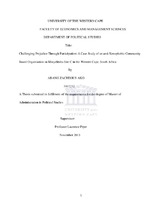| dc.contributor.advisor | Piper, Laurence | |
| dc.contributor.author | Ako, Abang Zacheous | |
| dc.date.accessioned | 2014-06-11T12:13:18Z | |
| dc.date.available | 2014-06-11T12:13:18Z | |
| dc.date.issued | 2013 | |
| dc.identifier.uri | http://hdl.handle.net/11394/3317 | |
| dc.description | Magister Administrationis - MAdmin | en_US |
| dc.description.abstract | This study is an investigation into how the Site C, Action Committee Against Xenophobia
(SACAX) in Khayelitsha was able to mobilise the community, community based organisations, and governance structures alongside national and international Non-Governmental Organisations working with refugees to successfully challenge prejudice towards African immigrants in the period leading to the World Cup 2010. The primary objective of this mobilisation was to raise consciousness about the plight of African
immigrants; prevent a new round of attacks; and also to ensure that state officials were better prepared to intervene in future outbursts. The various stakeholders that took part in this cogovernance space are unanimous that the SACAX programme ushered in a new era of creating awareness and civic education that changed significantly the perception of the community towards African immigrants during the World Cup 2010.
The thesis will also show how SACAX also encourage a more active citizenship and also built network between civil society including national and international NGOs and local state. These efforts created a new set of relations and saw the construction of new sets of relations in terms of capacity building across civil society, the state and local and international actors. This resulted in both the creation of an early warning mechanisms and also networks to coordinate efforts in future outburst. This was an example of a Co-governance space or nascent „participatory sphere‟. The example of SACAX is thus a case of civil society deepening democracy in three ways: expanding democratic values, building democratic citizenship and creating new participatory institutional capacity. This then elucidates the role civil society can play in influencing citizens directly, government and public policy. Indeed, to the extent that this network forms the basis of
a substantive partnership between state and civil society from local to international levels, such co-governance around the policy issues can be seen as a nascent form of participatory space as identified by Cornwall and Coelho (2007:1). | en_US |
| dc.language.iso | en | en_US |
| dc.publisher | University of Western Cape | en_US |
| dc.subject | African immigrants | en_US |
| dc.subject | Community based organisation | en_US |
| dc.subject | Deliberative democracy | en_US |
| dc.subject | Democracy | en_US |
| dc.subject | Discrimination | en_US |
| dc.subject | Migration | en_US |
| dc.subject | Participation | en_US |
| dc.subject | Prejudice | en_US |
| dc.subject | Public participation | en_US |
| dc.subject | Xenophobia | en_US |
| dc.title | Challenging prejudice through participation: a case study of an anti-xenophobic community based organisation in Khayelitsha site c in the Western Cape, South Africa | en_US |
| dc.type | Thesis | en_US |
| dc.rights.holder | University of Western Cape | en_US |

